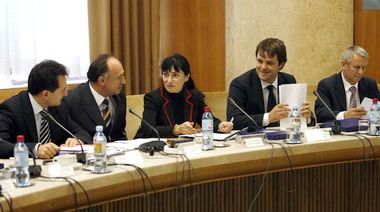- Serbia
Get to know Serbia
- Citizens
Culture and science
Health services
Pension and disability insurance
- Business
Employment
Economy
- Media
- Government
- Contact
Keep in touch
Contact form
Back
Keepin touch
Whether you have a question, comment, suggestion or any problem in the purview of the government, send us your message and we will try to respond as soon as possible. If your problem is not in our purview, we will forward your message to the relevant institution.
Q:
A:
2010 budget in final draft stage
Belgrade,
14 October 2009
Minister of Finance Diana Dragutinovic today stated that the budget for 2010 is in the final drafting stage, noting that Serbia needs a sustainable budget that can support the economy in recession.
At the presentation of the Internal Financial Control Strategy in the Serbian Public Sector, Dragutinovic stressed that Serbia’s programme with the IMF, the assistance it will receive from international financial institutions, as well as the trust in its market, recovery dynamics and the country’s economic perspective will all depend on its budget.
She warned that Serbia must not carry too much debt, adding that the best solution is to cut expenses, bearing in mind the significance of establishing an internal financial control system.
Dragutinovic also noted that developing this system is an obligation stemming from Serbia’s European perspective, but added that those principles are also imposed by the World Bank and the IMF as a condition for their support.
The Minister said that financial management and control, internal auditing and the central harmonisation unit are the elements of the internal financial control in the public sector.
The goal is to create a system that will ensure greater efficiency, transparency and safety, Dragutinovic said noting that this cannot be done overnight.
This system should be taken as a basis, and not as a mould, she added explaining that its goals and results are of crucial importance.
Deputy Prime Minister for EU integration and Minister of Science and Technological Development Bozidar Djelic stressed that the budget is of the utmost importance, which is why a system must be secured in order to show to both Serbia’s citizens and foreign partners, primarily those in the EU, that the money is spent in a legal manner.
Djelic noted that the European Commission’s report recognises Serbia’s progress, but also notes that the administrative capacity in the Ministry of Finance and other ministries is not yet at the desired level, meaning that internal and external controls must be Serbia’s priorities in the years to come.
He stressed that since Serbia is at the early stage of introducing the system of internal and external financial control, this is an adequate assessment, noting that the State Auditing Committee must be further developed. He also said that the control systems will boost trust in democracy, as well as convince tax payers that their money is being spent properly.
The goal of the Internal Financial Control Strategy in the Public Sector is to address key elements concerning the current state, but is also a long-term plan for establishing and developing a comprehensive, efficient and decentralised internal financial control system in the public sector in order to manage the public funds properly, Djelic concluded.
She warned that Serbia must not carry too much debt, adding that the best solution is to cut expenses, bearing in mind the significance of establishing an internal financial control system.
Dragutinovic also noted that developing this system is an obligation stemming from Serbia’s European perspective, but added that those principles are also imposed by the World Bank and the IMF as a condition for their support.
The Minister said that financial management and control, internal auditing and the central harmonisation unit are the elements of the internal financial control in the public sector.
The goal is to create a system that will ensure greater efficiency, transparency and safety, Dragutinovic said noting that this cannot be done overnight.
This system should be taken as a basis, and not as a mould, she added explaining that its goals and results are of crucial importance.
Deputy Prime Minister for EU integration and Minister of Science and Technological Development Bozidar Djelic stressed that the budget is of the utmost importance, which is why a system must be secured in order to show to both Serbia’s citizens and foreign partners, primarily those in the EU, that the money is spent in a legal manner.
Djelic noted that the European Commission’s report recognises Serbia’s progress, but also notes that the administrative capacity in the Ministry of Finance and other ministries is not yet at the desired level, meaning that internal and external controls must be Serbia’s priorities in the years to come.
He stressed that since Serbia is at the early stage of introducing the system of internal and external financial control, this is an adequate assessment, noting that the State Auditing Committee must be further developed. He also said that the control systems will boost trust in democracy, as well as convince tax payers that their money is being spent properly.
The goal of the Internal Financial Control Strategy in the Public Sector is to address key elements concerning the current state, but is also a long-term plan for establishing and developing a comprehensive, efficient and decentralised internal financial control system in the public sector in order to manage the public funds properly, Djelic concluded.
-
 Belgrade, 11 August 2025
Belgrade, 11 August 2025Support for agricultural projects worth RSD 750 million
-
 Belgrade, 21 July 2025
Belgrade, 21 July 2025Construction of oil pipeline with Hungary to begin early next year
-
 Belgrade/Athens, 17 July 2025
Belgrade/Athens, 17 July 2025Serbia continues to align with EU in field of energy
-
 Kostolac, 14 July 2025
Kostolac, 14 July 2025First solar power plant Petka in Kostolac put into trial operation
-
 Belgrade, 11 July 2025
Belgrade, 11 July 2025Potential for improving cooperation with Belarus in many areas
-
 Požega, 5 July 2025
Požega, 5 July 2025Section of Pakovraće - Požega highway officially opened
-
 Belgrade, 2 July 2025
Belgrade, 2 July 2025Technical specifications defined for Serbia-Hungary oil pipeline
-
 Belgrade, 30 June 2025
Belgrade, 30 June 2025IMF confirms Serbia successfully implementing all agreed reforms
-
 Belgrade, 27 June 2025
Belgrade, 27 June 2025Double Taxation Avoidance Agreement with Germany signed
-
 Kostolac, 25 June 2025
Kostolac, 25 June 2025Construction of Kostolac wind farm nearing completion

